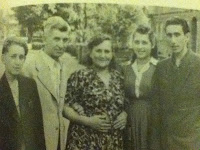Hinda Grinblat Ella Bryir
 |
Hinda Bryir
|
MAIL: mailto: dana3895@walla.com shirosha@hotmail.com
Survivor: Code: RelatioNet HI GR 30 KAPO
Family Name: Bryir
Previous Family Name: Grinblat
Previous First Name: Hinda
Present First Name: Ella
Father Name: Bengamin
Mother Name: Gittle
Brother Name: Wilhelm
Brother Name: Henry
Date of birth: 23/7/1930
Country of birth:Poland
City ofBirth
Survivor: Code: RelatioNet HI GR 30 KA
Family Name: Bryir
Previous Family Name: Grinblat
Previous First Name: Hinda
Present First Name: Ella
Father Name: Bengamin
Mother Name: Gittle
Brother Name: Wilhelm
Brother Name: Henry
Date of birth: 23/7/1930
Country of birth:
City of
The Interview with Hinda
Hinda was born in a small town in Poland Vienna
One of major memories that Hinda told us about herself was her lovely collection of dolls. She told us how much she loved sewing clothesn for them and dressing them. Even when her aunt brought her a talking doll fromEngland Krakow , and began to study in a Polish school.
One of major memories that Hinda told us about herself was her lovely collection of dolls. She told us how much she loved sewing clothesn for them and dressing them. Even when her aunt brought her a talking doll from
 |
Grinblat's Family
|
Four years later, in 1941, Hinda and her family were forced to move to the ghetto in Krakow . After a year in the ghetto, her parents moved to an arbeitslager, but before they moved, they gave her and her little brother, Henrry, to a non-jewish family, near Wieliczka. Her parents told her that they were her uncles, and she grew up with their children. In 1945 her parents and Wilhelm took them from the non-jewish family, and ran away to hide in the forest. About a year later, the war ended.
In 1946 Hinda joined The Joint (movement) which was a charity organization that helped the Jewish community worldwide. At the camp she met Dov Bryir who was a sports trainer. After dating for a year, they got married on the 4th of June, 1947 at her parents' house. Hinda and Dov got an apartment near her parents' house. At that time Hinda worked as a waitress in a small restaurant which belonged to the Jewish community on Dolna street.
In 1949, David, their oldest son was born, and in 1950 they sailed to Israel Sava " to live with friends in one room. Because they left their "Beit - Olim", an absorption center, they lost all the rights that immigrants received on coming to Israel
The town – Kanczuga
Kanczuga was a small town in Galicia , Poland
In 1942 the Nazis rounded up Kanzcuga's Jews and marched them to the cemetery, where they murdered them and buried them in a mass grave. When the war broke out in 1939, some of the Jewish men from Kanczuga fled eastwards into what became Soviet territory. Most of the men who had fled eastwards came back to Kanczuga in the second half of 1941 following the German attack on Soviet territory. The men who came back to Kanczuga were all caught by the Germans and murdered. During the month of July 1942, the Jews who were still in Kanczuga had to get new stamps on their work permits, to enable them to stay in Kanczuga. The Jews were rounded up in the synagogue and from there sent to a nearby camp where there was a selection - the old and weak were shot in a nearby forest and around 150 young men were sent to work camps. The rest of Kanczuga Jews were sent to the death camp at Belzec.
In 1942 the Nazis rounded up Kanzcuga's Jews and marched them to the cemetery, where they murdered them and buried them in a mass grave. When the war broke out in 1939, some of the Jewish men from Kanczuga fled eastwards into what became Soviet territory. Most of the men who had fled eastwards came back to Kanczuga in the second half of 1941 following the German attack on Soviet territory. The men who came back to Kanczuga were all caught by the Germans and murdered. During the month of July 1942, the Jews who were still in Kanczuga had to get new stamps on their work permits, to enable them to stay in Kanczuga. The Jews were rounded up in the synagogue and from there sent to a nearby camp where there was a selection - the old and weak were shot in a nearby forest and around 150 young men were sent to work camps. The rest of Kanczuga Jews were sent to the death camp at Belzec.

